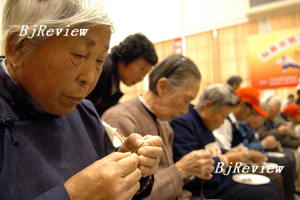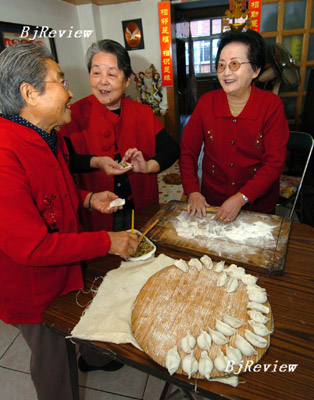
"Hey, little buddy, will you support me when I'm getting old?" Han Wenshan, 35, asked his newborn baby as he picked him up at home.
The Chinese tradition of raising sons to support parents in their old age has been diluted by the rapidly growing economy and improving standard of living. As is the case with developed countries, China faces an aging society. People are living longer and having fewer children. Therefore many Chinese families are falling into a 4-2-1 family pattern: a couple raises one child and supports four elderly parents. But few realize that a problem looms ahead.
The aging of the population is a trend that now affects a growing number of countries. Not long ago, the Information Office of the State Council, China's cabinet, issued a white paper on measures China is taking to help its elderly population. The paper said China's population entered the aging phase at the end of the 20th century as the proportion of people aged 60 and above accounted for over 10 percent of the entire population. By the end of 2005, China had nearly 144 million people over 60, accounting for 11 percent of the population, according to the white paper.
 An expanding aged population inevitably means that many issues must be addressed, as the problem concerns every aspect of society. It puts more pressure on each family, causing disturbing economic consequences and serious social problems. It also challenges the labor force supply and the pension system. An expanding aged population inevitably means that many issues must be addressed, as the problem concerns every aspect of society. It puts more pressure on each family, causing disturbing economic consequences and serious social problems. It also challenges the labor force supply and the pension system.
"I used to think that it's not an issue for me to provide for the aged," said Han, whose parents and parents-in-law all enjoy pensions and medical insurance. But last year Han's father suffered a serious illness and afterward Han began to feel the pressure on his shoulders.
"It was a difficult time for me," Han said, adding that the medical expense was over 100,000 yuan and his father's medical insurance was completely inadequate, as was the pension. "Our savings almost all went for the medical expense," said Han, who works for a private company and considered himself fairly well-off.
After his father recovered, Han opened bank accounts for each parent and deposited some money into the account every month to prepare for future uncertainties. In addition, he has to save money every month to provide for his son's future education. "I'm now breaking my back working to support my family: saving pensions for the parents, my son's education funds, the mortgage, living costs."
Han also bought some commercial old-age insurance for himself. "We have to take precautions before it is too late, and many of my colleagues share the same view," he said.
Preparation is lacking
China is still not prepared to face the aging society issue, psychologically or materially, some experts say. Government officials and scholars are discussing the issue, however, and working to come up with a solution. But there are no quick steps.
Some experts suggest increasing the retirement age from the current 55 for women and 60 for men by some five years. Though the pressure on the pension system could be eased a bit, others argue that this would make it harder for young people to find jobs.
There's also the suggestion that the family planning policy should be loosened but opponents say this would only result in more births in rural areas, but will not affect the situation in the cities. According to Ren Yuan, associate professor in the Institute of Population Research (IPR) at Fudan University, more births will affect the demographics of aging, but it won't reduce the absolute number of the aged.
Another obstacle is that the financial means to deal with the problem are somewhat limited since China is still a developing country. "When the Western countries became aging societies, their per-capita income was triple that of the Chinese level," said He Ping, Director of the Social Insurance Research Institute of the Ministry of Labor and Social Security.
Experts also warn that the best chance to solve the aging problem will be within the next 25 years. According to a study on China's aging population by the China National Committee on Aging under the State Council, the problem will reach its most critical point between 2030 and 2050.
 "The demographic change from an 'adult society' to an aging society took only 18 years in China, compared with decades or even hundreds of years in developed countries," said Li Bengong, Executive Deputy Director of the China National Committee on Aging. "The demographic change from an 'adult society' to an aging society took only 18 years in China, compared with decades or even hundreds of years in developed countries," said Li Bengong, Executive Deputy Director of the China National Committee on Aging.
Li said the number of elderly people is expected to reach 248 million by 2020 and climb to a peak of 437 million by 2051. "We have to seize the opportunity to tackle this serious problem or we will regret it later if we miss it," Li said.
"It's the best time to improve China's old age social security system and medical security reforms," said Zhou Xiaochuan, Governor of the People's Bank of China, the central bank.
Employees in China have individual social security accounts, but the money some current workers deposit in their accounts has been used to pay pensions to retirees. As a result, the fund is running a deficit of 800 billion yuan, according to statistics.
"The 800 billion yuan is a big problem but people don't have to worry about that as it is the government's responsibility to make that up and our government is capable of doing that," said Zheng Gongcheng, a social security expert at Renmin University of China.
The ongoing old age security reform has stopped the situation in which employees' deposits are used to pay pensions. But the issues of how to make up the deficit and how to make the different social groups benefit from the reform remain unresolved.
Devising plans
According to the white paper, China is setting up a flexible basic old age pension mechanism that adjusts the basic pension based on salary levels and fluctuations in the prices of goods.
Meanwhile, China is raising old age funds through more diversified channels to be more financially prepared for the expanding aging population. The Central Government is increasing financial subsidies as well.
The government is also encouraging companies to establish annual funds for their employees as a supplementary old age security benefit, which are co-funded by the companies and the employees. Besides, personal savings for old age support are being encouraged, as well as strengthening the old age security system through multiple channels.
With his wife having passed away last year and his two children working abroad, 74-year-old Beijing resident Xing Li is one of the typical "empty nest" members. His daughter tried to persuade him to live with her in Canada or go into a nursing home. But Xing declined, saying, "I might be ill at ease in a foreign country because it's a totally strange place to me. I'd rather stay in Beijing as I feel I belong here."
The "big family" tradition no longer prevails in China and the function of supporting the elderly at home has been weakened, leading to an increasing number of "empty nest" old people.
But, according to Yuan Xin, demographic researcher with Nankai University in Tianjin, supporting the aged at home is the best option, considering China's level of economic development and ethical traditions.
In any case, Xing is lucky. His community began to set up an elder-care center modeled on child-care centers, providing meals, entertainment and rest facilities for the aged where they can stay during the day.
In cities like Beijing such elder-care centers are booming but the number still cannot meet the growing demand. "So far China has close to 40,000 public elder-care establishments and an additional 1,700 started by non-governmental organizations, with a total of 1.5 million beds," said Jia Xiaojiu, an official with China's Civil Affairs Ministry.
To solve the shortage of elder-care establishments, some communities in Beijing began to adopt a practice from neighboring Japan: the "saving time" project, in which younger retirees take care of the older ones or sick ones as volunteers and record their service time. When these volunteers need to be taken care of, they can be repaid with services according to their service time.
In addition, there's a new phenomenon called the old-age apartment, which follows a commercial pattern and is built by real estate developers. The aged live in an apartment alone during the week, and on weekends and holidays there is a family get-together.
"Old people feel lonely when they are separated from their children while their children are too busy to provide a comfortable living space for the elderly, but now the elder-care apartment can to some extent solve the problem," said Shou Lili, who formerly was a researcher at the Shanghai Research Center On Aging.
| 